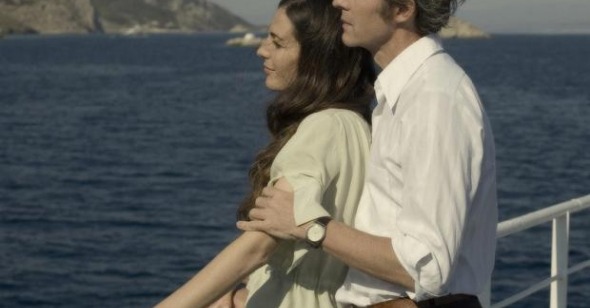Clean, Shaven
by Travis Mackenzie Hoover
Fugitive Pieces
Dir. Jeremy Podeswa, Canada, Samuel Goldwyn Films
First you feel bad. Then you get over it. And those preceding two sentences comprise all the useful information to be gleaned from Fugitive Pieces, which takes the trauma of the Holocaust and a lifetime of struggle with guilt and remorse and makes it all look like the most tasteful damned thing you ever done saw. One would congratulate director Jeremy Podeswa on broaching the subject without sensationalism, but he’s pulled back to such a degree that there’s absolutely nothing of him—or anything recognizably human—in the whole movie. A collection of wax dolls tries to enact a journey from emotional retreat to acceptance; there’s no there there. Nothing—certainly not the characters—has been developed beyond shorthand and types. You don’t shake your fist and curse the filmmakers (which is more than I can say for Emotional Arithmetic, the other recent Canadian Content production), but you watch vaguely entertained, completely unmoved, and puzzled as to why Podeswa felt inclined to bother.
We’re vaguely clued in to the fact that Jakob (Stephen Dillane) has been scarred by his brush with the Nazis. His family murdered in Poland, he survived through the intervention of a Greek archaeologist Athos (Rade Serbedzija) and now exists as a writer in Toronto. Yes, when his adult story opens, he’s failing in a relationship with Alex (Rosamund Pike), unable to let her in or accept her love. But the dynamics of the relationship are rather shaky. Alex is one of those sexy spitfires created by male filmmakers to satisfy their urges and get feminist points, while Jakob is noticeably devoid of personality. It’s not at all credible that an aggressive woman like Alex would have anything to do with this unresponsive lump, and, her stereotyping notwithstanding, it’s a tragedy she leaves him flat if only because we’re trapped with a very opaque character for the rest of a very indistinct movie.
Of course, part of the film’s shtick are the flashbacks to the tragedy, the aftermath of the tragedy, and the lead-up to the tragedy—specifically memories of Jakob’s older sister, Bella (Nina Dobrev), who’s on hand to be so warm and inviting that sexual intimations are hard to ignore. But this is less an acknowledgment of the erotic undertones of childhood and sibling relationships than Podeswa’s inability to define a personality: once again, we have a young woman, and she’s radiant and sexy. But she’s not much of a personality—like everyone else. Athos rates more of a presence, probably because he’s asked to actually influence the young Jakob, but he doesn’t have any decisive impact: in fact, the flashbacks aren’t organized in a manner that develops a thesis about Jakob’s progress or creates any sort of meaning. What matters is that they are there, that there’s a past strangling the present as in all good Canadian narratives, that our hero suffers, and that he’s on a path to acceptance presented in simplistic and condescending terms.
Everything in this movie has been done for show. In America, “doing things for show” would involve fronting badass and mounting demonstrative melodrama: that would be bad, but it’s better than the Canadian version, which is to first show how much you suffer and then show how much you can shoulder the burden. It’s enough that Jakob has his traumatic badge of honor: there’s no real examination of the distance between the marked person and society, or the complicated struggle involved in clawing your way back out of fear and alienation with people who don’t understand your pain. It’s first understood that the stoic victim is a serious subject for a movie: then, perversely, it’s suggested in the final reel that he should just get over it already—meanwhile, a parade of “strong-willed” sex objects waltz in and out of his life. That Podeswa can’t come up with a more nuanced expression of his hero's pain shows just how far on autopilot he works (the less traumatic matter of my Asperger's diagnosis had more kinks to it than the smooth edges of this movie).
But of course, the damned thing is tasteful, and, to be fair, Podeswa doesn’t phone in the visuals the way he mumbles his statement of purpose. You couldn’t accuse him of exploitation, exactly, because he clearly intends, through gauzy visuals and a well-struck sense of quietude, to keep this thing out of the hands of shrieking pop melodrama. You can say that for Fugitive Pieces, but that’s all you can say. There’s no personal observation in this movie: Podeswa has no opinions on human behavior that go beyond his simple basic thesis, as if imposing himself on the material would contaminate the experience with his arrogance. But filmmakers can’t help having opinions. It’s just that the opinion here—narratively and aesthetically—is that participating at any level is a bad idea. Thus this film will strike some as being profound primarily through its differences with other bad movies on the subject. Call it a variation, not an improvement. In craft the movie is a cut above other Canadian victim dramas, but intellectually it’s the same old, same old.
Americans should note that the film has been shorn of some running time since its tepid reception at the Toronto Film Festival—the downer ending of Anne Michaels’s beloved novel has disappeared, and reconciliations are all around instead of something awful. I haven’t read the novel, so I don’t know how that plays out in context, but I do know that it probably doesn’t make a difference if tragedy strikes or not. Jakob floats through this movie so determined not to engage in his life that the hand of God would be entirely superfluous, hammering home what’s already obvious: choice don’t exist. Be like Jeremy—go with the flow and don’t ask questions.
